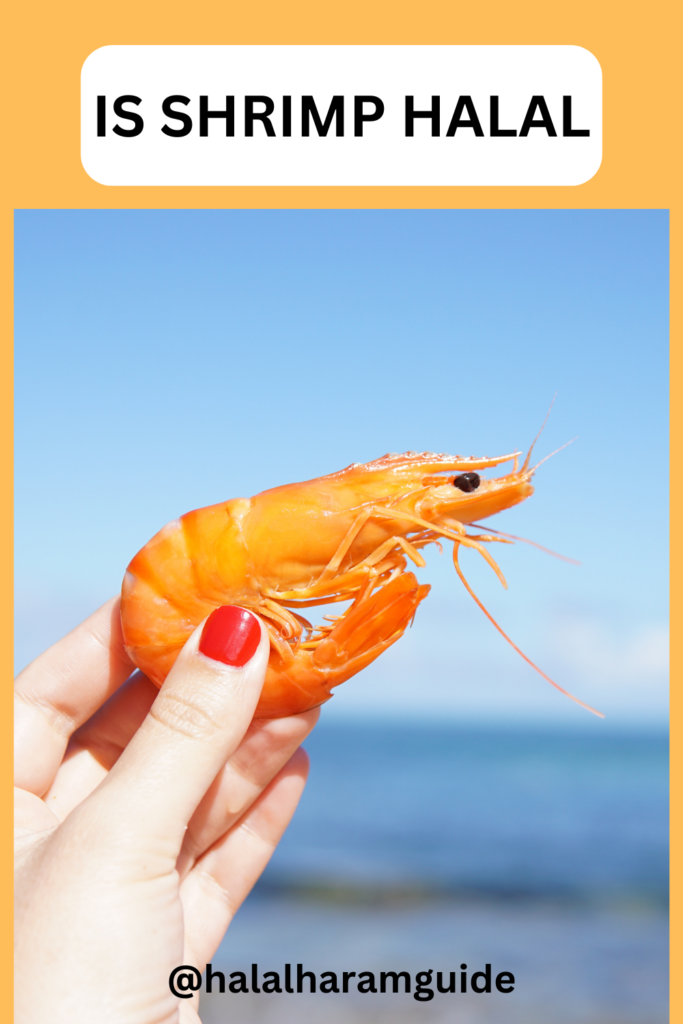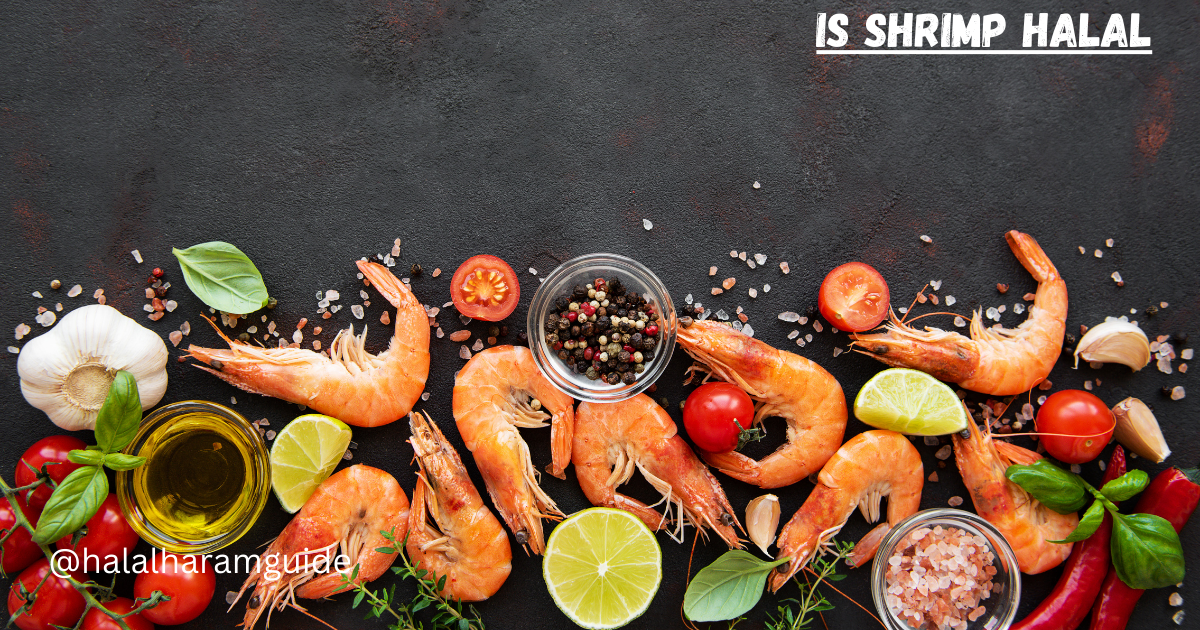In the realm of dietary choices, the question often arises, “Is shrimp halal?”
This inquiry reflects the careful consideration many individuals give to their dietary practices, particularly when following Islamic dietary laws. Shrimp, a popular seafood delicacy enjoyed worldwide, can be a subject of debate among Muslims who aim to ensure that their food aligns with halal principles. In this blog post, we delve into the topic of shrimp, exploring whether it is considered halal in Islamic dietary guidelines.
Our aim is to provide clarity and insights for those who wish to make informed choices about their food while staying faithful to their halal dietary preferences and beliefs.
Is Shrimp Halal Or Haram?
The permissibility of consuming shrimp in Islam, whether it is considered halal or haram, has been a topic of discussion among Islamic scholars. There are different schools of thought, and opinions may vary. Here are the main viewpoints:
Permissible (Halal):
Some scholars and Islamic jurists consider seafood, including shrimp, to be halal. They argue that since shrimp are aquatic animals and they die in water, they are permissible to eat. They base their opinion on the Quranic verses that generally permit the consumption of seafood, such as Surah Al-Baqarah (2:168) and Surah Al-Ma’idah (5:96).
Impermissible (Haram):
Other scholars believe that shrimp and other shellfish are haram (forbidden) due to the Hadith (sayings and actions of the Prophet Muhammad) that specifically mention the prohibition of consuming animals that do not have scales. Shrimp, being crustaceans, do not have scales. The Hadith that is often cited in this context is found in Sahih Bukhari and Sahih Muslim.
It’s important to note that this is a matter of interpretation and religious jurisprudence, and opinions may vary among different Islamic scholars and schools of thought. Some Muslims may choose to avoid shrimp and other shellfish due to the differing opinions, while others may consider them permissible (halal). It’s advisable for individuals to consult with their local religious authorities or scholars for guidance on specific dietary matters related to their faith.
Does the Quran Consider Eating Sea Food Halal?
The Quran generally permits the consumption of seafood, which includes various types of fish, as halal (permissible) for Muslims. While the Quran does not provide an exhaustive list of permissible and forbidden foods, it does mention seafood as one of the allowable food sources. Here are relevant Quranic verses:
Surah Al-Baqarah (2:168):
“O mankind, eat from whatever is on earth [that is] lawful and good and do not follow the footsteps of Satan. Indeed, he is to you a clear enemy.”
Surah Al-Ma’idah (5:96):
“Lawful to you is game from the sea and its food as provision for you and the travelers, but forbidden to you is game from the land as long as you are in the state of ihram. And fear Allah to whom you will be gathered.”
These verses generally indicate that seafood is considered permissible (halal) for Muslims to consume, provided that it is obtained through lawful means and prepared in accordance with Islamic dietary guidelines.
Why In Shi’i fiqh Are Shrimp Halal But Lobsters And Crabs Are Haram?
In Shia Islamic jurisprudence (fiqh), the permissibility of consuming certain seafood, such as shrimp being considered halal while lobsters and crabs are considered haram (forbidden), is rooted in their interpretation of Islamic dietary laws. The primary distinction between these seafood items lies in the classification of their aquatic species and the way they are obtained and prepared.
Shia scholars, like their Sunni counterparts, generally refer to the Quran and Hadith (the sayings and actions of the Prophet Muhammad) for guidance on permissible and forbidden foods. In this context, it is crucial to consider the Hadith that mentions specific criteria for seafood consumption. The Hadith often cited is one that requires aquatic animals to have scales and fins to be considered halal. Shrimp, which have exoskeletons and are considered to possess scales, meet this criteria and are thus deemed halal.
On the other hand, lobsters and crabs, despite being aquatic creatures, are crustaceans that do not possess scales or fins as defined in the Hadith. Therefore, they are considered haram by Shia scholars, adhering to the interpretation that aligns with the prohibition on animals lacking these characteristics.
What Does Scholar Say About Shrimp Being Halal Or Haram?
The permissibility of consuming shrimp in Islamic jurisprudence varies among scholars and schools of thought. There are differing opinions regarding whether shrimp should be considered halal (permissible) or haram (forbidden). Here are some perspectives on this issue:
Permissible (Halal):
Some Islamic scholars and schools of thought consider shrimp to be halal. They argue that since shrimp are aquatic animals that die in water and have exoskeletons (which some scholars consider as fulfilling the requirement for scales), they meet the criteria for halal seafood consumption. These scholars interpret the Hadith that mentions animals with scales and fins as allowing the consumption of shrimp.
Impermissible (Haram):
Other scholars and schools of thought believe that shrimp should be considered haram because they do not have true scales and fins as defined in certain Hadith. According to this view, seafood lacking these specific characteristics should not be consumed.
The disagreement arises from differences in interpreting the Hadith and Quranic verses related to permissible foods. The Hadith often cited in this context is one that lays out the criteria for halal seafood based on the presence of scales and fins. Since shrimp have exoskeletons rather than true scales, some scholars consider them problematic from a strict interpretation of this Hadith.
1. Shaikh Ahmad Kutty Thoughts On Shrimp Being Halal.
As of my last knowledge update in September 2021, I do not have specific information regarding the thoughts of Shaikh Ahmad Kutty on the permissibility of shrimp being halal. It’s important to note that Islamic scholars may have varying opinions on this matter, and individual scholars may issue fatwas (religious rulings) based on their interpretation of Islamic jurisprudence.
To know Shaikh Ahmad Kutty’s specific stance on whether shrimp is considered halal or haram, I would recommend referring to his published writings or seeking guidance from him directly if he has provided specific guidance on this issue.
Islamic scholars often issue fatwas and provide explanations for their rulings in books, articles, or through Islamic organizations, and these sources may contain their views on dietary matters, including the permissibility of consuming shrimp.
2. Mufti Muhammad Taqi Usmani’s Opinion on Shrimp Being Halal.
As of my last knowledge update in September 2021, I do not have specific information regarding the opinion of Mufti Muhammad Taqi Usmani on whether shrimp is considered halal or haram. Mufti Muhammad Taqi Usmani is a prominent Islamic scholar and jurist, and he has authored many works on Islamic jurisprudence and fiqh.
To find Mufti Muhammad Taqi Usmani’s specific stance on the permissibility of shrimp being halal, you may need to consult his published writings, books, or seek guidance from him directly if he has provided specific fatwas or rulings on this matter. Islamic scholars often issue fatwas and provide detailed explanations for their rulings in their publications or through their association with Islamic organizations, and these sources may contain their views on dietary matters, including the permissibility of consuming shrimp.
Please note that the opinions of Islamic scholars on dietary matters can vary, and it’s important to consult with scholars or religious authorities who follow the same school of thought or jurisprudence that you adhere to for guidance on specific issues related to halal and haram foods.
3. Mufti Abdur Rahman ibn Yusuf Explains His Thought About Shrimp.
As of my last knowledge update in September 2021, I do not have specific information regarding Mufti Abdur Rahman ibn Yusuf’s opinion on whether shrimp is considered halal or haram. Mufti Abdur Rahman ibn Yusuf is a respected Islamic scholar and jurist, and he has written extensively on various aspects of Islamic jurisprudence and Islamic finance.
To find Mufti Abdur Rahman ibn Yusuf’s specific stance on the permissibility of shrimp being halal, you may need to consult his published works, articles, or seek guidance from him directly if he has provided specific fatwas or rulings on this matter.
Islamic scholars often issue fatwas and provide detailed explanations for their rulings, and these may be found in their publications or through their association with Islamic institutions.
Please keep in mind that the opinions of Islamic scholars can vary, and it’s important to seek guidance from scholars or religious authorities within your specific Islamic tradition or school of thought for matters related to dietary laws and what is considered halal or haram.
Conclusion
In conclusion, the halal status of shrimp is a subject that varies among Islamic scholars and communities.
While some scholars consider shrimp to be halal, others have reservations due to differences in interpretation of Islamic dietary laws. The key factors in determining the permissibility of consuming shrimp revolve around whether it meets the criteria of being a permissible seafood and whether it has been properly slaughtered or harvested according to Islamic principles.
As a result, the acceptance of shrimp as halal may differ among individuals and communities. Muslims seeking to include shrimp in their diet should consult with knowledgeable religious authorities or scholars to ensure their dietary choices align with their understanding of halal principles and practices.
Frequently Asked Questions
Which Seafood Is Haram In Islam?
Shrimp and prawn are closely related, and the terms are sometimes used interchangeably. However, there are subtle differences between them. Shrimp tend to have a slender body and a bend in their tail, while prawns have a more significant body and a straighter tail. They may also have slightly different flavors and textures when cooked, but in many culinary contexts, the terms are used interchangeably.
Are Shrimp And Prawn The Same?
Shrimp and prawn are closely related, and the terms are sometimes used interchangeably. However, there are subtle differences between them. Shrimp tend to have a slender body and a bend in their tail, while prawns have a more significant body and a straighter tail. They may also have slightly different flavors and textures when cooked, but in many culinary contexts, the terms are used interchangeably.
Are Shrimp haram in pakistan?
The permissibility of shrimp in Pakistan, as in other countries, may vary among Islamic scholars and schools of thought. While some scholars and Muslims consider shrimp to be halal, others may classify them as haram based on their interpretation of Islamic dietary laws. The classification of shrimp as halal or haram may also depend on how they are sourced and prepared. It’s advisable for individuals in Pakistan to consult with local religious authorities or scholars for specific guidance on this matter.
4. Any Pakistani brand made the shrimp?
As of my last knowledge update in September 2021, Pakistan is known for its seafood industry, and it exports various types of seafood, including shrimp, to international markets. Numerous Pakistani seafood companies and brands may be involved in the production and export of shrimp and other seafood products. The availability of Pakistani shrimp brands may vary depending on the region and market.
5. What makes shrimp halal or haram?
The classification of shrimp as halal or haram in Islam is primarily based on interpretations of Islamic dietary laws. The key criteria used in determining the permissibility of seafood include the presence of scales and fins. According to some interpretations, aquatic animals must have both scales and fins to be considered halal. Since shrimp do not have true scales (they have exoskeletons), some scholars consider them haram. However, others may consider shrimp halal due to their exoskeletons and other factors.
- “Is Lobster Halal? Understanding Its Permissibility”
- “Is Drawing Haram in Islam? Understanding the Perspective”
- “Is Fermented Kimchi Halal? Exploring Kimchi’s Halal Status”
- “Is Collagen Halal? Unveiling the Halal Status of Collagen”
- “Is Wine Vinegar Halal? Unveiling Its Permissibility”


